May polls offer first test since general election
- Published
One year on......
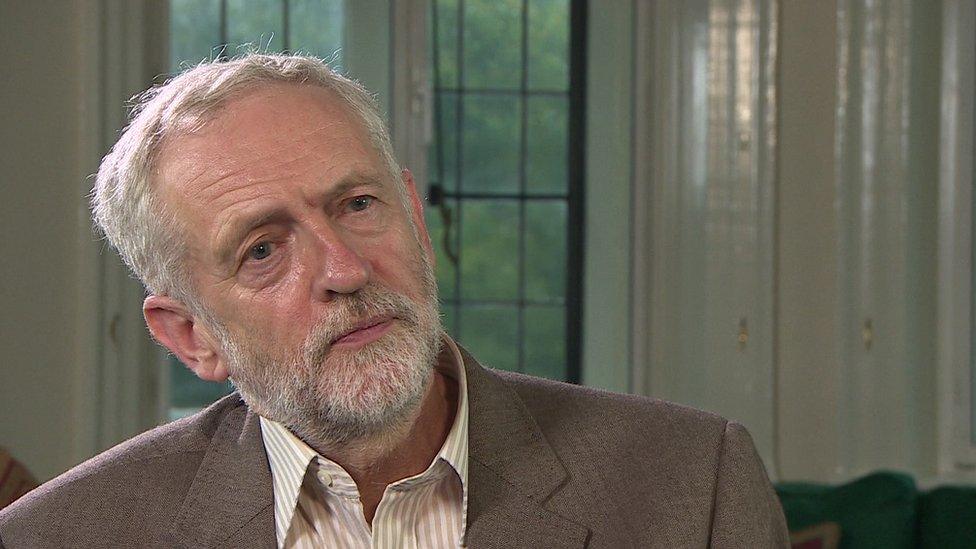
Can Jeremy Corbyn find traction for his anti-austerity message?
It's always galling for local politicians to find their fortunes inextricably linked with those of their national counterparts, irrespective of their own merits or demerits. Those of us with long memories recall how council elections can become more like killing fields when Westminster's pendulum swings this way or that.
In normal times, one year on from a general election victory is the point when majority governments get a warning from the voters that any honeymoon period is over. But these are not normal times and our party politics defies much of that conventional wisdom.
After last May's unexpected general election result, now comes the first big test. Was the Conservatives' victory some sort of aberration? Is the even more unlikely equally unexpected Labour leadership winner Jeremy Corbyn finding traction for his anti-austerity message? Can the Liberal Democrats see any glimmers of hope after their general election meltdown? UKIP's earlier electoral threat may have forced the EU referendum on to the agenda, but can they now dispel the image of a party on the slide? Will the Greens sustain their claim to be a party of power as well as protest?
Crunching the numbers

330 seats are being contested in 17 district and unitary authorities in the West Midlands alone
The sheer scale of this exercise in local democracy makes it much more than just some parochial sideshow compared with Westminster's main events. Thee hundred and thirty seats are being contested in 17 district and unitary authorities in our part of the country alone. The Conservatives are standing in all of them. Labour will fight nearly all, missing out only a handful in Cheltenham and Gloucester. This is the second year running that UKIP and the Green Party are both fighting more seats here than the Liberal Democrats. The Lib Dems are contesting about half of the total number of seats here, but their candidates are conspicuous by their absence across significant areas to the west of Birmingham and in Warwickshire.
The other number to bear in mind in all this is 2012. The last time most of these particular seats were contested was four years ago, when Labour were riding high in the polls. This sets their 'base year' very high, so they will have to work hard to avoid looking like a party losing support under Jeremy Corbyn.
Birmingham
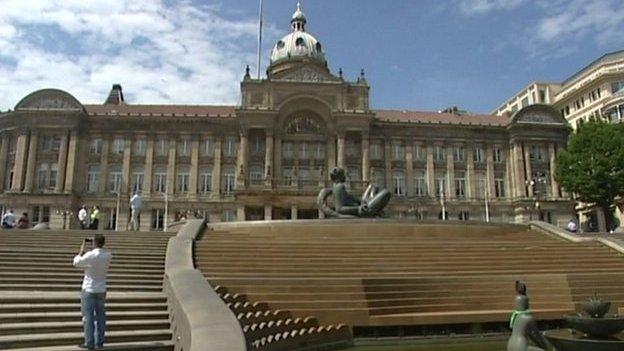
It's the last time one third of the city's 120 seats will be contested under the traditional four-year cycle. Next year sees the first full council election in Britain's biggest local authority. Labour's 36-seat majority is unassailable, but it will be an important test after the council's well-documented failures, which led to a change of leadership and saw it come within an inch of being run by government-appointed commissioners.
Cannock Chase
Often the scene of drama in the past, Labour defend a majority of just four in a town where the marginal parliamentary seat was successfully defended by the Conservatives last year. Of the 13 seats being contested, 10 are Labour defences, so expect yet another of those needle contests.
Cheltenham
The only Liberal Democrat-controlled council in our part of the country has half of its 40 seats up for election. At the general election the Conservatives ended 23 years of unbroken Lib Dem representation at Westminster and now they will be fighting hard to overturn the Lib Dems overall majority of eight. The Greens are fielding a full slate of candidates, which could pose a further challenge to the Liberal Democrats' support base. Labour, by contrast, are not fielding a full slate of candidates.
Coventry
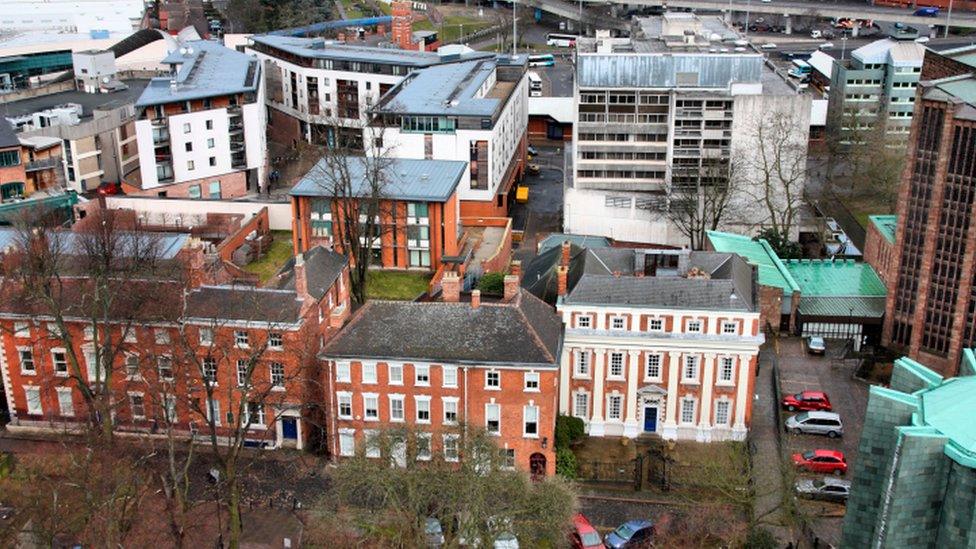
With one third of the 54 seats to be contested, Labour's majority of 28 is unassailable.
Dudley
Another of those knife-edge councils. Labour's majority has come under pressure in a town where UKIP have established a significant presence. Labour's majority of just 5 could well be in danger, with no fewer than 17 of their seats to be defended. Meantime, the Conservatives have little to lose with just 5 of their seats up for election. UKIP do not defend any of their seven this time.
Gloucester
A full council election in a city which has a habit of swinging between the Conservatives and Labour in council and parliamentary contests. The Conservatives defend a majority of just four but, perhaps significantly, Labour are not fielding a full slate. This will also pose a significant test for the Liberal Democrats, who have seven seats to defend.
Newcastle-under-Lyme
So often another of those knife-edge council and parliamentary battle grounds, the council currently has a minority Labour administration. With 20 of the council's 60 seats up for the election, the Conservatives are battling to make inroads into the nine Labour defences in the hope of forming at least a minority administration themselves.
Nuneaton and Bedworth
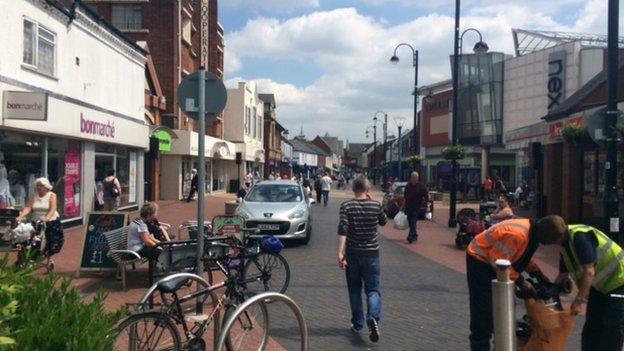
Nuneaton was famously the early marginal declaration which set the Conservatives on course for majority government last May
Nuneaton was famously the early marginal declaration which set the Conservatives on course for majority government last May and they will be hoping to dent Labour's 21-seat majority on the council as well. With half the council's 34 seats up for election, this will be an important test for Labour in a high-profile electoral battlefield.
Redditch
The home of the needle industry is set for a needle contest. In a marginal town which the Conservatives retained in the general election a year ago, Labour defend a single-seat majority, with seven of their own seats up for grabs. One third of the 29 seats are being contested.
Rugby
One third of the 42 seats are up for election in a town with a minority Conservative administration. If they are to strengthen their hold, the Conservatives will have to target the three Labour and two Liberal Democrat seats that are up for election this time.
Sandwell
Labour hold all but four of the council's 72 seats, one third of which are up for election.
Solihull
In the smallest but most affluent of the seven metropolitan districts, the Conservatives defend an overall majority of 12. Last year the Conservatives recaptured the parliamentary seats after 10 years in Liberal Democrat hands. Now it is the Green Party who currently form the official opposition on a council where one third of the seats are being contested.
Tamworth
With 10 of the council's 30 seats up for election, the Conservatives defend a majority of six. They have just four seats to protect while Labour have five, so the Tories will be hoping to strengthen their grip in Robert Peel's home town.
Walsall
The home of the saddle-making industry has a speciality in photo finishes. The Conservatives currently have a minority administration even though Labour have two more seats. With 20 of the 60 seats up for election, Labour defend nine, the Conservatives seven and the Liberal Democrats two. So there is plenty of scope here for another round of deal-making and power-brokering.
Wolverhampton
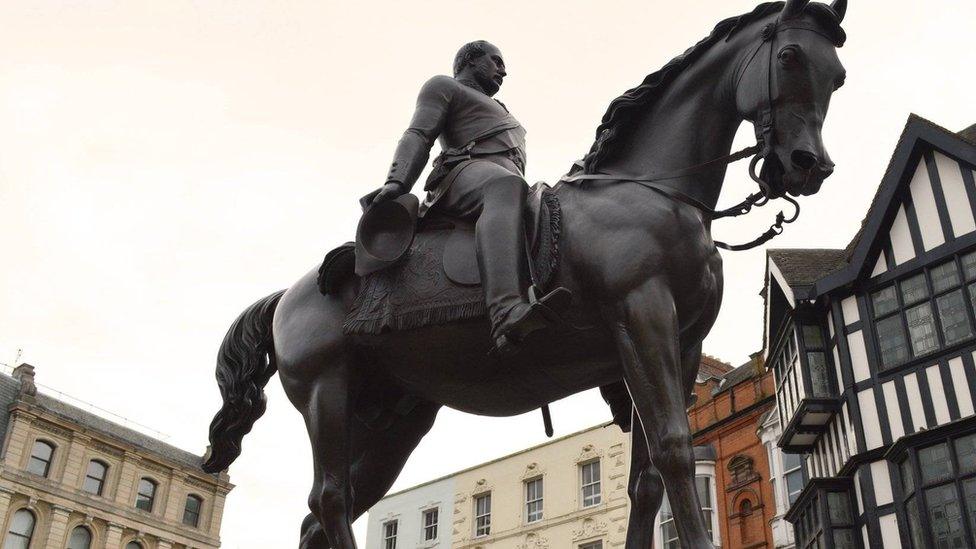
One third of the 60 seats are up for election in Wolverhampton, where Labour defend a majority of 35
One third of the 60 seats are up for election in a city where Labour defend a majority of 35. Most attention will focus on Tettenhall Regis, scene of a bizarre local government first. When red-faced Conservative organisers realised they had mistakenly named two candidates for one ward it was too late to withdraw either of them from this first-past-the-post contest. Result: Two Tories must compete against each other, risking a split vote which could cost their party the seat.
Worcester
"The Faithful City" has a penchant for switching its affections between the Conservatives and Labour, both at Westminster and in the council chamber. With one third of the 35 seats up for election, the Conservatives have a majority to defend of just three. Six Labour seats are up for election. So the Conservatives will hope to add to their tally of five seats to strengthen their position.
Wyre Forest
Once synonymous with the campaign over Kidderminster hospital which brought 'people power' to the Commons and the council chamber, Wyre Forest has now reverted to its more orthodox political identity. With 11 of the 33 seats up for election, the Conservatives have a comfortable majority of 13 to defend.
For full lists of candidates go to your own local council's website.
How much, who, where, why?
So much for the mathematics and the geography. What about the narrative and the stories that go with them? We'll have the first of our special reports from the key contests in this weekend's Sunday Politics. Joining me in the studio will be three leading politicians whose own areas feature prominently on this electoral roll call:
Mark Garnier is the Conservative MP for Wyre Forest; Valerie Vaz is the Labour MP for Walsall South; and Baroness (formerly Lorely) Burt was the Liberal Democrat MP for Solihull for 10 years until her defeat by the Conservatives last May.
I hope you can join us too, in our usual Sunday Politics Midlands 11:00 slot on BBC One this Sunday, 17 April 2016.